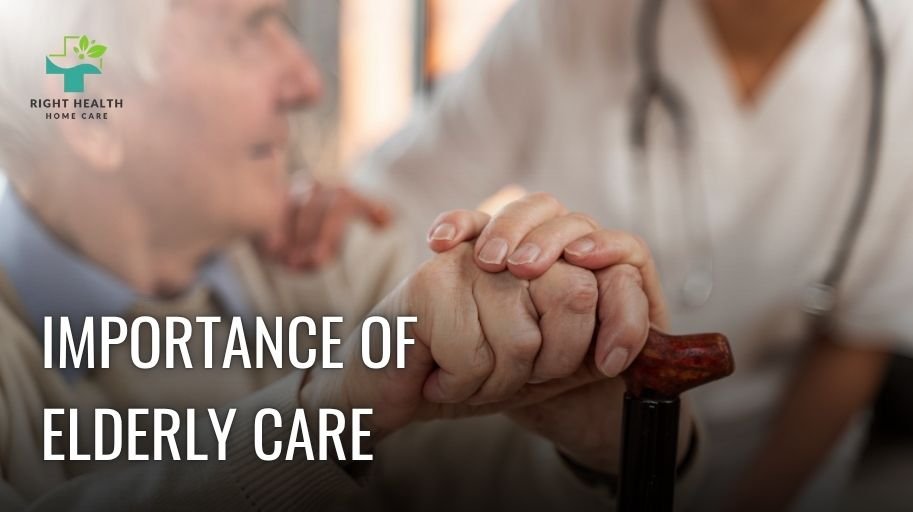The Importance of Elderly Care: Honoring Experience, Preserving Dignity
Elder care has changed from being a social obligation to becoming a practical, ethical, and emotional need as the world’s population ages. The elderly spend their life building families, supporting communities, and providing services to the public. In along with being kind, assuring that individuals get the respect, care, and attention they are due as they age is crucial to any society’s overall health. This blog examines the value of elder care, the difficulties that older people encounter, and the ways that communities and families can offer crucial support.

Understanding Elder Care
To enable senior individuals to live independent, comfortable, and respectable lives, “elderly care” refers to the assistance, emotional support, and services provided to them. It could include everything from medical attention and help with everyday duties to socializing and friendship. Senior care includes more than just taking care of ailments. The goal is to offer an environment wherein seniors can keep their mental, emotional, and physical health.
What Makes Elderly Care Crucial?
- Safety and Physical Health
Elderly people are more likely to suffer from mental health conditions like dementia or Alzheimer’s, as well as chronic ailments like diabetes, heart disease, and arthritis. Preventing issues, dealing with them quickly, and conducting regular checks are every aspect of proper senior care. In-home caregivers or assisted living facilities can help ensure safety, especially when it comes to preventing medication errors or falls.
- Emotional and Mental Wellness
Elderly people sometimes experience depression and loneliness, particularly if they are living alone or have lost a partner. Regular mental stimulation, emotional support, and friendship can significantly improve their quality of life. Elder care fosters meaningful relationships, treatment, and hobbies that build emotional fortitude.
- Maintaining Independence and Dignity
A common fear among older people is losing their liberty or becoming a burden to their families. In addition to offering the right kind of assistance, good senior care respects their demand for autonomy. Seniors who get respectful assistance training from caregivers can receive assistance with eating, dressing, and bathing without being less important.
- Reducing Family Stress
Family members may experience mental and physical fatigue when caring for an elderly parent or grandparent, particularly if they lack the necessary time or abilities. Professional senior care services help families maintain loving relationships without getting caregivers burn out by decreasing this stress.
- Promoting Ageing in Place
A typical desire of seniors is to spend as much time as possible in their homes. Elder care may facilitate development by providing therapists, nurses, or other caretakers with sporadic visits. Thanks to care services and home updates, seniors may stay in familiar environments without risking their health or safety.
Common Issues Elderly People Face
Aging is a normal aspect of life; however, it can also present some difficulties that might impair seniors’ quality of life:
- Chronic pain and limited mobility
- Cognitive decline or memory loss
- Social isolation and loneliness.
- Financial instability.
- Post-retirement loss of purpose;
- Losing a spouse or peers
Families’ Role in Elderly Care
In many cultures, family is still the primary care for the elderly. However, the strains associated with modern living, like job duties and distance, can make providing direct care challenging. Families can continue to be active in several ways, though:
- Regular contact via phone or in-person meetings
- Including elderly family members in choices or events
- Making certain they have insurance and access to healthcare
- Honoring their autonomy and preferences
- Seeking qualified assistance when necessary
Expert Services for Elderly Care
As the demand for senior assistance increases, a wide range of expert services have surfaced, providing:
- Personal care and in-home nursing
- Retirement communities or assisted living
- Occupational and physical therapy; hospice and palliative care; and geriatric care management
Families’ Function in Elder Care
In many cultures, family members still provide nearly all the care for the elderly. However, the stresses of contemporary living, like work commitments and distance, may make providing direct care challenging. However, families can continue to be active in several ways:
- Consistent communication over the phone or in person
- Respecting their autonomy and preferences
- ensuring they have insurance and access to healthcare
- involving senior family members in decisions or events and, when required, seeking out skilled support
Professional Elder Care Services
The increasing need for senior support has led to the rise of a wide range of professional services, including:
- Personal care and in-home nursing
- Geriatric care management, hospice and palliative care, and occupational and physical therapy in assisted living or retirement communities.
Final thoughts
Rather than being merely a service, elder care is a statement of values. We recommend to the community, family, and compassion by honoring and supporting the elderly. Practically or emotionally, caring for our seniors is an investment in mankind.

